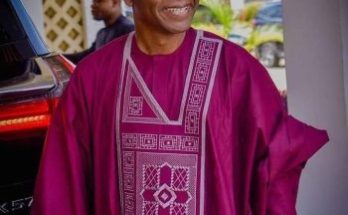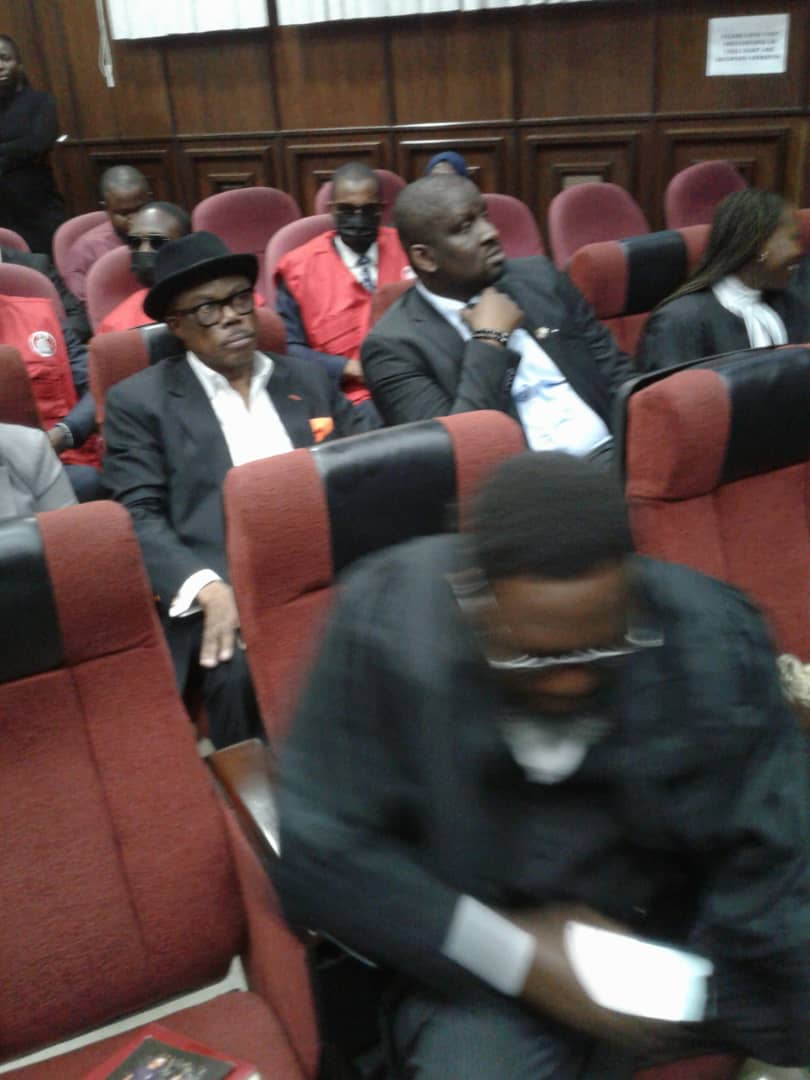The Presidential Election Petition Tribunal (PEPT)Wednesday upheld the victory of Bola Ahmed Tinubu of the All Progressives Congress (APC) as being validly elected during the February 2023 elections.
The judgment was the climax of months of legal firepower between Tinubu/APC lawyers and those of some opposition parties who challenged his victory.
The challengers are former Vice President Atiku Abubakar of the Peoples Democratic Party (PDP), Mr Peter Obi of the Labour Party(LP), as well as the Allied People’s Movement (APM).
…APM
In the first ruling of the day, the Justice Haruna Tsammani-led panel dismissed the APM’s petition while ruling in a preliminary objection filed by the Independent National Electoral Commission (INEC), the APC Tinubu, Vice President Kashim Shettima and Kabiru Masari, who were 1st to 5th respondents respectively in the matter.
Reading the ruling, Justice Tsammani observed that the issue of qualification and disqualification of a candidate is a constitutional matter, adding that the issue of nomination does not flow from the grounds of disqualification as provided in the Constitution.
The five-member panel agreed with the respondents that the petition was incompetent, lacking in merit, and an abuse of court processes on the grounds that the case was a pre-election matter.
The tribunal affirmed further that the case of the petitioner having been a pre-election matter ought to be filed at the Federal High Court and not before the tribunal.
Further to that, it added that even if the tribunal had powers to hear the case, it has already become statute barred, having not being filed within 14 days as prescribed by law.
The tribunal held: “Findings showed that the case of the APM was premised on the alleged unlawful nomination and sponsorship of the vice president, Kashim Shettima, which ought to be a pre-election matter,”
The tribunal agreed with the respondents that the suit was incompetent and that the petitioner lacked the necessary locus standi to file the case in the first place, since it did not participate in the primary election of the APC.
Also in a judgment in the main petition, the panel held that the petitioner failed to prove that Tinubu breached Section 35 of the Electoral Act, 2022, when he nominated Shettima as his running mate, adding that it was Tinubu’s’s prerogative to choose his running mate.
While pointing out that Shettima did not knowingly present himself for double nomination, the tribunal held further that the case of the petitioner was faulty because Shettima never obtained any nomination form for the position of Vice President nor contested any primary election for the position.
Subsequently, the panel held that the issue of alleged double nomination had been dealt with by the Supreme Court which is the final court in the land and as such no other court can adjudicate on it.
“The petitioner failed to prove that Tinubu was not qualified to contest the February 25 presidential election on the grounds of double nomination, it ruled.
…Alleged conviction
On the alleged conviction of the APC candidate, the PEPT held that there was no evidence of conviction against President Bola Ahmed Tinubu in the alleged forfeit of the sum of $460,000 to the US over alleged complicity in drug-related offences in the early 90s.
The PEPC also expunged more than 10 documents submitted by Obi, deeming them impermissible because they were made in anticipation of or during the pendency lawsuit.
The decision, according to the court, is in accordance with the legal provision outlined in Section 83(3) of the Evidence Act 2011.
Additionally, one document was expunged because it did not meet the proper certification requirements as stipulated under Section 104 of the Evidence Act 2011.
In its ruling, the five-member panel stated that the petitioners failed to prove that Tinubu was found guilty of any offence involving any act of dishonesty, adding that evidence before the court showed that the forfeiture order against Tinubu was in a civil and not criminal matter.
Justice Tsammani agreed with the respondents that Tinubu was neither arraigned nor convicted in the US over any alleged crime to warrant his disqualification.
In another verdict, the tribunal declared that both Obi and his party failed to substantiate allegations of fraud and drug allegations against the president.
The tribunal subsequently held that Tinubu was eminently qualified to contest the February 25 presidential election.
Amongst grounds upon which Obi and LP sought the nullification of Tinubu’s emergence as president are that by virtue of a forfeiture order against Thim by a United States District Court, he ought not to be on the ballot.
During the proceedings, the petitioners had claimed Tinubu was made to make the said forfeitures.
While giving the verdicts, the court cited a document tendered by the respondents confirming that Tinubu was given a clean bill of health upon an enquiry from Nigeria.
Further faulting the case of the petitioners, the tribunal held that Section 269(1&2), provides that such documents must be given under the hand of a police officer and must be accompanied with a certificate showing that the police officer has powers to sign such documents.
Also, the tribunal pointed that even if Tinubu were convicted for the alleged offence, for him to be disqualified from the 2023 election, the purported conviction must take place within 10 years to the election.
Recall that the alleged forfeiture order was made nearly three decades ago.
…25% requirement
Ruling on the controversial 25% requirement in the Federal Capital Territory, the tribunal declared that the FCT doesn’t hold a higher status than other states in the country.
Justice Tsammani said, Section 134 (1) and (2) of the 1999 Constitution of Nigeria (as amended) stipulates that a presidential candidate must attain or score a majority of votes cast in a presidential election, where two or more candidates are involved, and at least 25% in two-thirds of the 36 States and FCT to meet the constitutional requirement to be declared as duly elected as President of Nigeria.
…Electoral Act never compelled INEC on BVAS
On compliance with the Electoral Act, the tribunal also dismissed claim by Obi and LP that the election that produced Tinubu did not comply with the Electoral Act, 2022, on grounds that results of the election were not transmitted real time to the INEC’s Results Viewing (IReV) portals.
The panel held that “nothing in the Electoral Act 2022 specifically states that BVAS should be used to transmit election result.”
While pointing out that Sections 14&18 of the Electoral Act provide for the use of the Bi-modal Verification Accreditation System (BVAS) for the purpose of accreditation of voters, the lead Judge emphasised that the ” IReV is not a collation system”.
The court said INEC elected to transmit results manually from the polling unit to the ward collation centre, then from ward to local government, from local governments to state, and finally to the federal.
The court also held that the petitioner failed to prove that the system was deliberately programmed the INEC to manipulate or rig the election.
In the same vein, the court also struck out portions of Obi’s claim of irregularities, corrupt practices
Recall that some paragraphs in the Obi petition contains allegations of irregularities and corrupt practices
Consequently, the five-member panel struck out the affected paragraphs on the grounds that they were “vague, imprecise, nebulous and failed to meet the requirements of pleadings.”
Objections by INEC
Ruling in the preliminary objections filed by INEC, Tinubu and APC, Justice Abba Mohammed, who read the ruling, held that “averments” must not leave room for confusion or ambiguity, saying the aim of pleadings is to avail respondents of the facts of the case so as to prepare adequately.
According to the ruling, in a case of alleged malpractices in over 500 polling units, it does not suffice for the petitioners to say some polling units or collation centers without being specific.
“Averments must not be general but specific”, Mohammed held, noting that “petitioners failed to specify polling units where anomalies occurred or where agents complained of alleged malpractices and irregularities.”
In addition the tribunal pointed that amongst the total of over 18,000 polling units where the petitioners alleged that INEC uploaded “blurred results ” unto the INEC Results Viewing (IReV) Portals, not one polling units was cited.
“They did not specify polling units where election results were not uploaded” or where scores attributed to them was reduced or added to Tinubu.
“They did not show the majority of votes they claimed they had scored “, the tribunal held, adding that petitioners only make generic allegations of irregularities and malpractices,” the panel further ruled.
Mohammed also faulted the petitioners for relying on a spreadsheet analysis, inspection results and experts reports.
According to Mohammed such documents ought to be served on the respondents to enable them do their own analysis and respond accordingly.
“The spreadsheet report, inspection results and experts’ reports were not served but only listed as documents to be relied on in adjudicating the petition.
“It is unimaginable that a petitioner will allege widespread rigging in 176,000 polling units, over 8,000 wards, 774 LGAs, 36 States and FCT without stating the specific place where the alleged irregularities occur,” the court said.
It subsequently went ahead to strike out the affected paragraphs as requested by the petitioners.
Merits of Obi’s petition
However, the court declined to dismiss the petition on grounds that Obi and LP failed to join Atiku Abubakar of the PDP, who came second in the February 25 presidential election.
The tribunal held that in an election petition case, the petitioners’ case is between the winner and the electoral body that contested the election.
The court also ruled on the merits of Obi’s petition and his membership of LP which was being contested by the respondents who claimed he was still a PDP member
It said Obi and LP certified the provisions of Obi being a member and therefore overruled the respondents’ prayer for his rejection.
Forensic report
On this, the court struck off the forensic report or evidence provided by the mathematics professor who carried out the analysis, because according to the PEPT, his evidence should have been provided at the point of filing the election petition so that the opposition can read them ahead of time.
The PEPC also ruled that LP candidate’s request for an extension of time to subpoena (call) 10 additional witnesses, not originally part of the petition, was a “surreptitious” attempt to amend the petition beyond the legally allowed 21-day timeframe.
The court found that this amendment is impermissible and consequently dismissed the application, while striking all testimonies from the witnesses and documents tendered by them.
…Atiku loses too
On the dual citizenship claim against Tinubu by Atiku, Justice Moses Ugo held that Atiku and PDP cannot smuggle new issues not pleaded in their petition on the grounds of non-qualification.
Justice Ugo ruled that the grounds were new issues and therefore upheld the objections of the ruling party and President Tinubu.
Atiku had argued that the APC presidential candidate was involved in a compromised agreement for narcotics related crime (proceeds of crime) in the United States District Court, Northern District of Illinois Eastern Division.
The former VP similarly argued that Tinubu failed to disclose in his form EC9 that he has dual citizenship of Nigeria and Guinea, having voluntarily acquired the citizenship of the Republic of Guinea.
Blueprint reports that 15 out of his 27 witnesses were deemed and declared ineligible by the tribunal.
The court declared that none of the allegations brought against both Tinubu and APC was proved with credible evidence.
As at the time of this report, two members of the panel namely; Stephen Adah and Misitura Bolaji-Yusuf adopted the reasoning and conclusions in the lead judgement.
However, two remaining judges; Moses Ugo and Abbah Mohammed were still waiting to take their turns on their own opinions.




